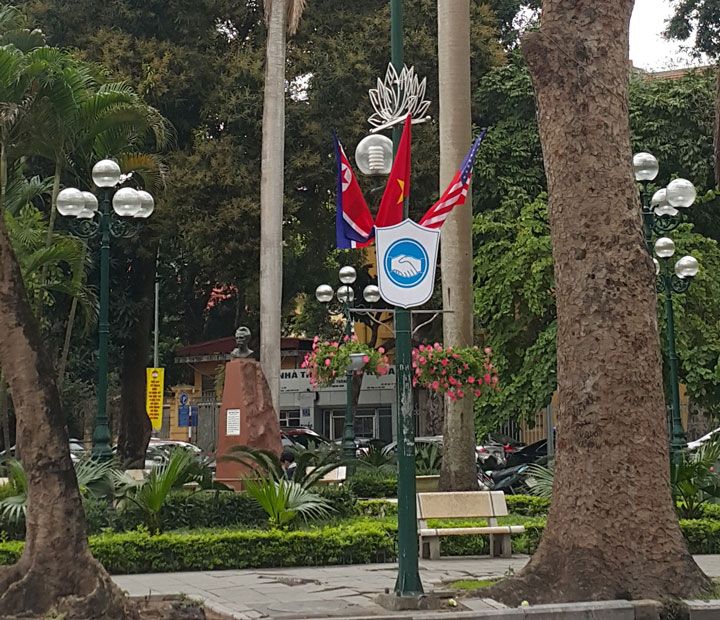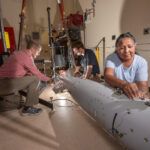Summit datebook: From Hanoi, with curiosity
By Duyeon Kim | February 26, 2019
 One of the flag "bouquets" adorning the old city portion of Hanoi. Photo by Duyeon Kim.
One of the flag "bouquets" adorning the old city portion of Hanoi. Photo by Duyeon Kim.
I landed in Hanoi a few days ago, curious. Curious about a once-divided country, now a growing economy, with South Korean footprints all over its business and pop culture, that can also relate to North Korea’s socialist system. Curious if we will see real progress this time on rolling back Pyongyang’s nuclear weapons program—whether there will be enough signs that indicate Kim Jong Un will embark on a credible path toward denuclearization or successfully manipulate President Donald Trump into front-loading on valuable US rewards. Curious if, without enough time to negotiate before the summit, American negotiators would be able to secure some concrete gains or be forced to again accept Pyongyang’s preferences and language for a deal and the way forward. US Special Representative Steve Biegun and his team know what a good deal looks like, and they have no illusions. But they’re faced with many tough variables that come with the territory of dealing with North Korea. And then there’s the Trump factor.
I’m curious if Trump will stay on script or ad-lib his way into bad deal. Curious if there will be some pronouncement of “peace” or an end to hostilities, and what Pyongyang might give in return for it. Curious, despite my skepticism and the world’s familiarity with North Korea’s nuclear playbook, whether I will be proven wrong and denuclearization is actually proven possible. As a specialist, this is the one forecast where I’d love to be wrong.
I went up to our hotel situated in Hanoi’s old quarter (Pho Co or “ancient town”), where the CBS outdoor live studio is being built on a balcony overlooking Hoan Kiem Lake. The major broadcast organizations have set up shop along this lake. The backdrop is important for TV news. I hug familiar faces from the Singapore summit—the cameramen, technical crew, and producers—and meet new colleagues working this one. They never get enough sleep covering a major story like this, but the jokes and laughter never stop.
I’m working again as a CBS news contributor with Evening News anchor Jeff Glor and a great CBS team, as was the case for the Singapore summit. My job is to provide on-air commentary and offer off-air guidance that might be helpful to the anchor, correspondents or producers.
It has so far been quiet; like the rest of the media and commentators, we’re waiting for the White House to release the summit schedule and official venues. My weather app was misleading. It’s quite cold here, although the thermometer says it’s in the 60s (Fahrenheit), the kind of chill you feel in your bones, perhaps because of the humidity. Everyone is bundled up in sweat shirts, scarves, and even padded jackets. The skies are grey, gloomy, and hazy. My late grandmother who survived both the Japanese colonial rule and Korean War—a woman of science and logic, a former physician, but endearingly very superstitious as many Korean moms and grandmothers are—would have shaken her head and said, it’s an omen for the summit and it’s because the sky (meaning, the “gods”) knows who’s coming to town. Symbolism is big in Korean culture. A bright and sunny day would signal a completely different forecast for the summit’s results. I should have brought warmer clothes…
Walking in the streets of the old quarter is like being in a time capsule. It has the feel of Seoul in the late 1980s. There are more modernized pockets—let’s say Seoul in the early 1990s—but the old quarter is rich with tradition, and modernization is allowed to go only so far. The government wants to preserve the historical sites. Still, I see a store selling Trump and Kim T-shirts. I hear that one barber shop is giving free Trump and Kim haircuts.
But aside from the streets being dotted with bouquets composed of the American, Vietnamese, and North Korean flags, it doesn’t feel like a major summit between two adversaries is about to be written in history books. There isn’t much of a buzz. The Vietnamese are busy going about their day, selling their latest merchandise, sitting on stump stools on the street eating and drinking, speeding off to their next destination in a wave of motorcycles, wearing face masks to protect themselves against exhaust fumes and pollution.
Some locals tell me that most Vietnamese are not as interested in politics and the summit as foreigners might assume. When Kim Jong Un arrived in Hanoi, groups of Vietnamese did gather along the streets, hoping to catch a glimpse of the unusual juxtaposition, what they call “superpower America and supervillain North Korea.” They’re drawn to the intrigue, the arrival of a “mysterious, tyrannical dictator” who many think brought ”embarrassment” to their country when a Vietnamese woman was found to have attacked Kim Jong Un’s older brother with the nerve agent VX in 2017. As “tyrannical” as the young Kim may be, the younger generation in Vietnam still has hope that he will be able to break from the dark path of his father—because age matters, they say. But the main focus of local curiosity this week—at least as expressed to me—seems to be a simple question: Why was Vietnam chosen to host the summit, and who will benefit from it? The locals tell me they like the publicity, but they’re also hoping that the United States will support their country politically when it comes to China after they host a successful summit. One local says that many of his friends and family don’t care what lessons Kim Jong Un learns from this summit—their attention is on Trump.
Somewhere beyond the hustle and bustle and the honking of cars, motorcycles, and modern rickshaws (“Cyclos”), senior officials from the United States and North Korea are likely scrambling to conclude negotiations and prepare for their top leaders to shake hands on a new deal. There’s much territory to cover—from the settling on the basics of the goals for denuclearization and peace, to agreeing on a plan that might chip away at North Korea’s nuclear weapons capabilities in return for whatever America can offer that is big enough to make Kim Jong-un seriously rethink the nuclear deterrent that he considers his crown jewels.
The final touches on the Singapore Joint Statement were being made just hours before the signing ceremony. The Singapore experience showed a key cultural difference in basic approach to negotiations: A direct, Western style by the United States, aiming for the bull’s eye (denuclearization); a more roundabout approach by North Korea, emphasizing relationship-building and caring about packaging as much as content. Time is surely on Kim’s side—he will outlast Trump and several more American presidents. Time is what it takes to negotiate and roll back North Korea’s nuclear weapons programs.
History suggests that Kim Jong Un won’t give up his nuclear weapons—the very source of his country’s survival. But this is where the art of negotiations come in. This is where even many skeptics are hoping for the best, despite the odds. After all, the world may never have another constellation of unconventional leaders from the United States, North Korea, and South Korea, all hoping to make history.
The Hanoi summit will determine whether denuclearization is possible in the long run. This doesn’t mean it’s an “all or nothing” summit on denuclearization. But it will reveal the range of possibilities: Might it lead to a freeze on the North’s nuclear program? Limitations or reductions? Complete denuclearization? The Hanoi summit will indicate whether Kim Jong Un is serious about one day completely abandoning his nuclear arsenal, and whether Washington is serious, in Pyongyang’s eyes, about reciprocating by providing a brighter future for the regime. It will indicate whether unconventionality and creativity might have been the missing links needed to solve this intractable problem, or whether the status quo will continue—with a nuclear-armed North Korea.
Together, we make the world safer.
The Bulletin elevates expert voices above the noise. But as an independent nonprofit organization, our operations depend on the support of readers like you. Help us continue to deliver quality journalism that holds leaders accountable. Your support of our work at any level is important. In return, we promise our coverage will be understandable, influential, vigilant, solution-oriented, and fair-minded. Together we can make a difference.
Keywords: Donald Trump, Kim Jong-un, North Korea
Topics: Columnists, Nuclear Weapons















